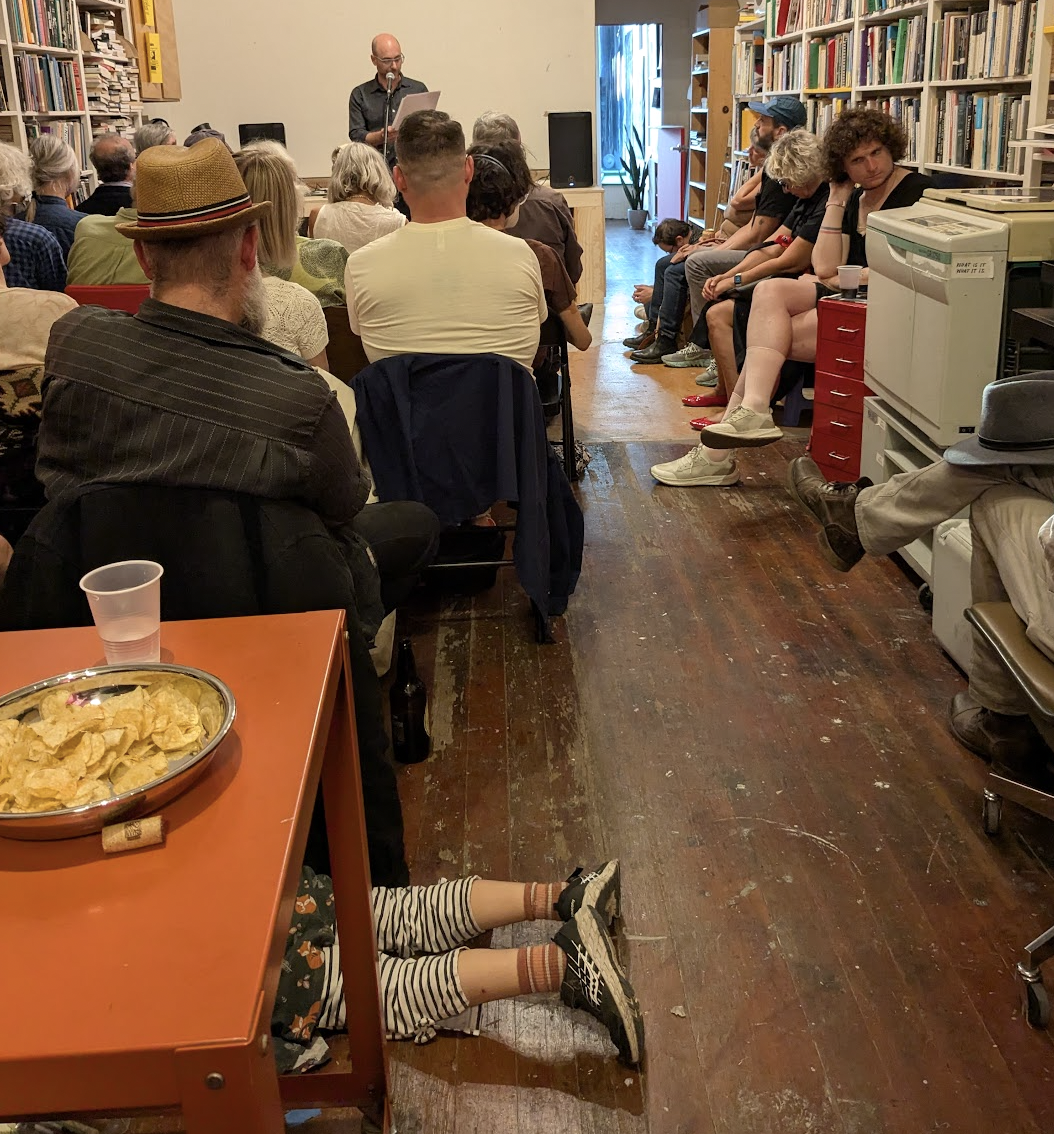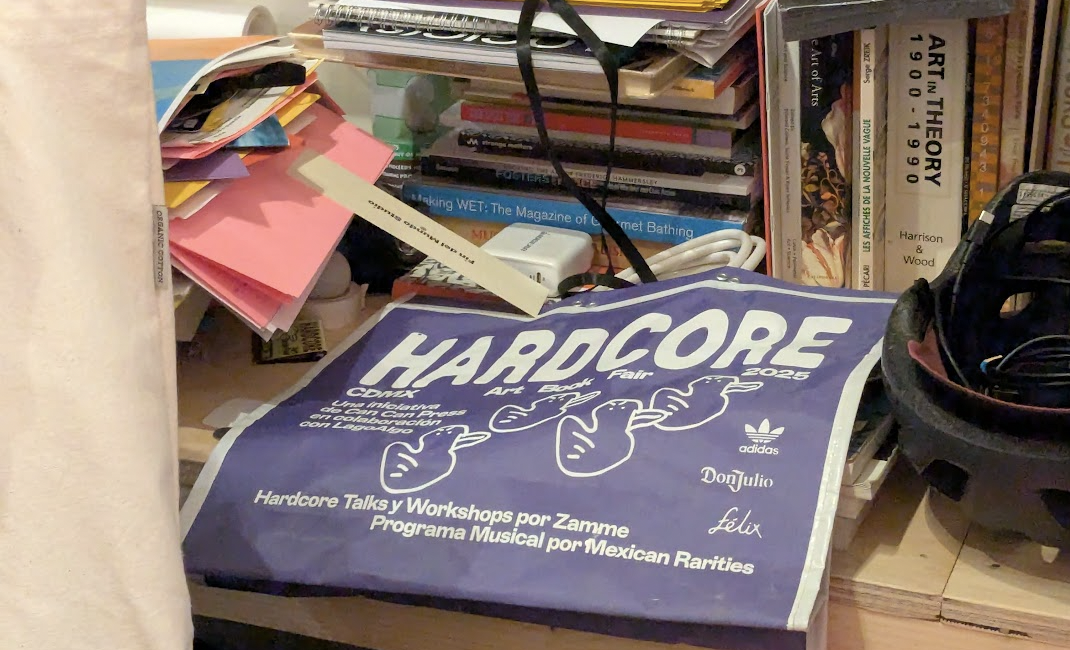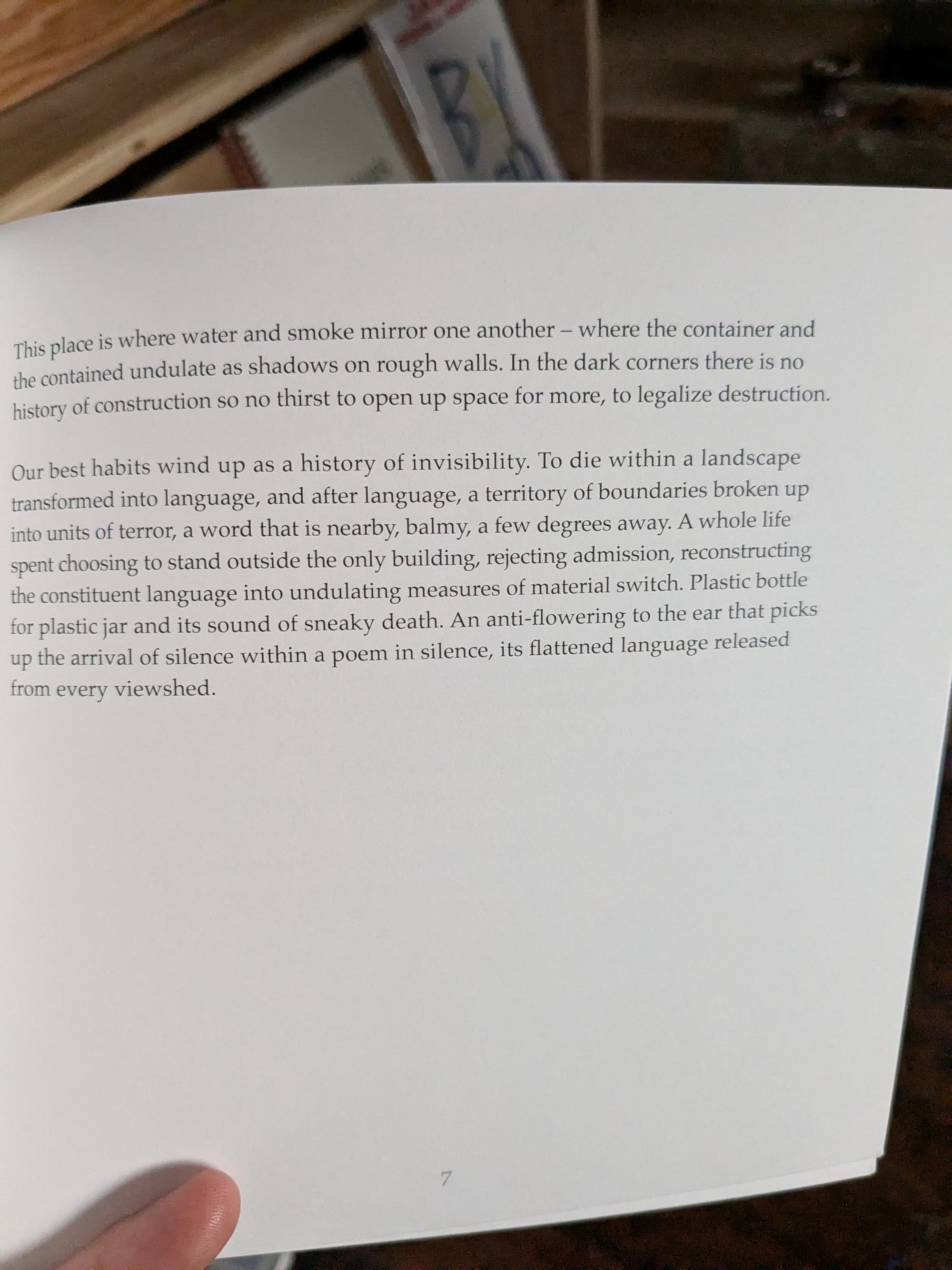On a Thursday evening, I am solo parenting and trying to avoid being stuck at home with a kid who won’t stop begging for the TV. I bargain: how about dumplings, the circus, and a poetry reading? At five and a half, she’s already rolling her eyes. “Ugghhh, not another poetry reading, not AGAIN.”
But we knock out the dumplings, and the circus, and survive a short but very loud meltdown on the brief drive to Bathers Library after the iridescent pinwheel toy which we purchased at the Circus Bella merch booth, five minutes ago, is lost, presumed dead, only to be miraculously found in the crevice between the car door and their carseat, where five year olds lose everything. Don’t look too close; who knows what else is down there.
We get there at 7:30, half an hour late but, I think, not the last to arrive. Jacob Kahn, organizer and host, welcomes us so warmly. In the second miracle of the evening, I remembered the tote with the coloring bag and pens, so my child settles on her stomach on the floor to color, while words that came all the way from Brooklyn shimmer over the audience.
The Bather’s Library storefront sells art books and broadsides, local presses sharing shelves with very far away ones. Open the half door from there to enter the library, where I have encountered even more unbelievably weird and fascinating books. The large shared tables for working together or talking about books and emergency radio have been tucked away somewhere and every chair is taken: It’s standing room only, for poetry on a summer Thursday. The evening is warm and air purifiers whir. Someone from Antiphony Journal & Press is one of the heads of hair and baldness in front of us, I learn later. I see a bob that might be poet Laura Moriarty.
At the back of the room, near the drinks and the bathroom—and the kid who needs both—I stand and listen, both to the poet and to the echoing cheers slitting in through the open back door, possibly from the bingo game at Beeryland two doors down. Something competitive is happening, somebody is winning.

Matt Longabucco was reading his work when we slide obtrusively in. I like a lot of his lines, and let out honks of appreciation and try to write them down in my phone (the lines, not the honks). The screen is cracked (hike, rocks), and whenI look at what I typed later and I don’t know if I got them down correctly or if autofuckingcorrect has hallucinated new poetry out of my clumsy noisy thumbs and memory.
From his “Nocturnes,” some good lines that are definitely his:
- “Look they're not sad poems, they're celebratory: they celebrate sadness. Celebrate means: find intricate."
- “Even crushing has its visions, let's go to that bar where I think someone smiled at me once.”
- “The way a few swift touches set a world spinning"
Some lines that were possibly interpolated by me and a machine:
- “Impulse control until you're ice"
- "Good lives are the problem, wandering, drifting”
- “Those hiking geese rooms for right in on Bushwick Park" [with gesture,”because New York"]
My child shows me her excellent coloring work, gesticulates quietly that she’s hungry. I fill her hands with chips, and up goes Diane Ward, who came down from Sacramento. I learn she has a PhD in geography and I am excited: Always go to geographers’ parties is a motto that has rarely steered me wrong. She begins with a poem by Fanny Howe, who has just died, titled "Broken Heart,” which has the following good lines:
- "Healing is a job that requires a mop”
- "Am I really better at being crushed than I was before?”
Ward’s reading opens with a Bachelard quote, but after that it’s mostly a blur: I am tired post-circus and pinwheel flip-out, true, but also, this is not really an oral poetics. The lines are long, I think we’re in the land of prose poetry, which is not a form I quite get; it feels underworked to me (isn’t the point of poetry the grammar of line versus sentence? The double take of enjambment and the simultaneity of both meanings in the same words?). Her mother is in the poems, her brother; my ear catches on a few landscape-y words that feel geographic. “An elevator, a space-time room.“ “To die within a land transformed into language." “From every view shed.”
I realize afterwards that she’s read the entire chapbook to us. So at least it was a holistic experience. We leave right away. Bedtime. I hope the rest of the audience talked and read and pulled books off the shelves in the library later.

Years ago, when I was trying to more actively consume books instead of letting the guilt of unread pages gnaw at me, a hunger I’ve only made worse by piling up more and more, I brought a big bag of poetry books to my parents’ house and proposed a Father-Daughter Poetry Book Club. We’d each read one collection a month, and then talk to the other person about what it was like. It also got a chunk of books out of my tiny Berkeley apartment and off my shelves.
We got through a few months. Like most book clubs, it was hard to sustain. The bag of books stayed there for a long time after.
But in the months we kept it up, I learned that my father Mike read for a good line. He loved a zinger, a closer, a kicker. I was always thinking about form and how the book worked as a whole: What story or argument about language was the book trying to make? I read with a pencil that spiderwebbed the words, found patterns. He read with a highlighter.
I felt disappointed then, seeing failure in difference. Now, though, I see how very, very hard it is to make language snap. Words are so soft, so malleable. How do you sharpen one phrase into something that sticks like a pin under skin, leaves someone pulsing?
I love a book length project, am awed forever by the whole-hearted vision of Twice Alive by Forrest Gander and its inner spirals. What a creature he built in that book. But these days, I also want the good line, the one that sticks with me. I want something I can take with me when the night is over. Something to remember you by.
And there was one accidental moment that snagged me real good. A skipped word or a stumble – and the poet commented: “No, I take that back,” gesturing the way you used to use a finger to turn back a cassette tape, making the rewind sound: whhirrruuppp. My daughter will never hear what I hear in that, which was every tape we recorded off the radio, the feeling of plastic teeth biting and turning, the sound of a song that's cut off early, every time.

